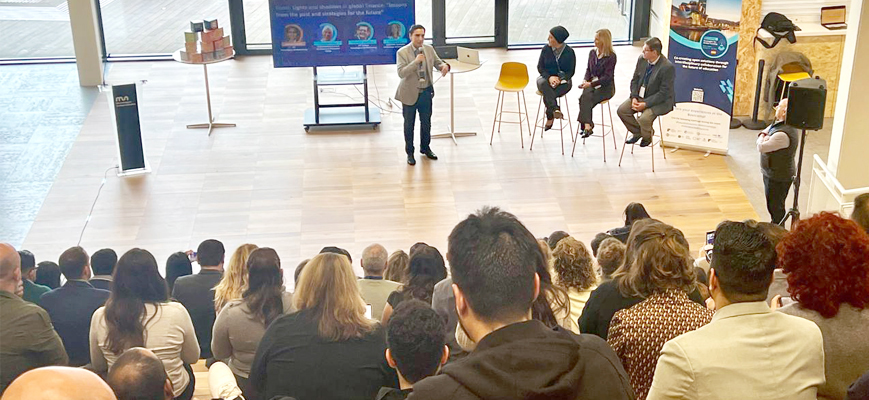Nearly one hundred experts in education from the five continents met in a bootcamp at Bilbao AS Fabrik to develop sustainable educational projects and analyze financing opportunities
Nearly one hundred experts in education from the five continents met in a bootcamp at Bilbao AS Fabrik to develop sustainable educational projects and analyze financing opportunities
Nearly one hundred experts in education from the five continents met in a bootcamp at Bilbao AS Fabrik to develop sustainable educational projects and analyze financing opportunities
Mondragon University and the Institute for the Future of Education (IFE) of the Monterrey Institute of Technology and Higher Education held a three-day bootcamp in Bilbao to seek interdisciplinary collaboration strategies for the future of education that can be funded worldwide.

Mondragon University and the Institute for the Future of Education (IFE) of the Monterrey Institute of Technology and Higher Education brought experts in education together at a bootcamp at Bilbao AS Fabrik in Bilbao entitled Co-creation of open solutions through interdisciplinary collaboration for the future of education: strategies for global financing. The bootcamp began on Sunday, October 27, and finished on October 29. Over the course of these three days, more than 85 professionals from 30 countries on 5 continents participated in an extensive program of activities to promote sustainable and internationally financeable educational projects. This project is being carried out within the framework of the alliance between Mondragon University and IFE Europe, which seeks to create a Space for Innovation and Research in Education in Bilbao.
The bootcamp aims to promote the creation of global funding strategies for educational projects that seek sustainable and open solutions. More specifically, this event highlights collaboration among researchers, academics and experts in education to develop proposals that respond to current challenges in the sector. The methodologies used include practical workshops on generative AI, gamification techniques (methods that apply gaming elements to motivate and engage people and make learning tasks more attractive), and the use of interactive multimedia resources that facilitate immersion in educational problems and solutions.
Program
Opening day, Sunday, October 27, included a gamified networking session. The conference began with a panel entitled “Exploring the future of education: sharing knowledge and openness for sustainability,” moderated by Dr. Antonio Martínez-Arboleda from the University of Leeds and the Knowledge Equity Network, and attended by experts such as Mondragon University vice-rector Jon Altuna, Igor Lesko from Open Education Global, Megan Mitchell from MIT-JWEL, Dr. María Soledad Ramírez from UNESCO, and Mike Hasenmueller from the Worldwide Universities Network (WUN).
The conference continued with two workshops. The first, entitled “Competitive intelligence: opportunities for global project funding,” addressed how to analyze funding opportunities using artificial intelligence and how to optimize grant proposals in education. The second, called “Designing interdisciplinary collaboration and conceptual project development for global problems,” provided strategies for establishing interdisciplinary collaborations and integrating science and education.
On October 29, the bootcamp came to an end with a panel entitled “Light and shadow in global financing: lessons from the past and strategies for the future,” moderated by Dr. Genaro Zavala Enríquez from IFE, and with the participation of experts such as Chadia Mansour from the International Council for Open and Distance Education (ICDE), Miguel A. Montoya Bayardo from IFE Europe, and Glenda Cox from the UNITWIN Network. The panel explored the global funding landscape, highlighting strategies and lessons that will be of use to attendees in designing their own projects.
Two additional workshops will take place later: first, “Best practices for winning proposals,” which will teach criteria and provide effective templates for creating successful grant proposals, and second, “Present your project idea and make a call to action,” in which participants will use artificial intelligence to present their projects in video format, with a demo session and commentary from expert evaluators. Each team will receive direct feedback and personalized follow-up recommendations to improve their proposals.
It is expected that research and innovation proposals will come out of this event, proposals to build the future of education collaboratively and transnationally, and proposals that will make it possible to address the enormous challenges posed by education systems at the global level.
